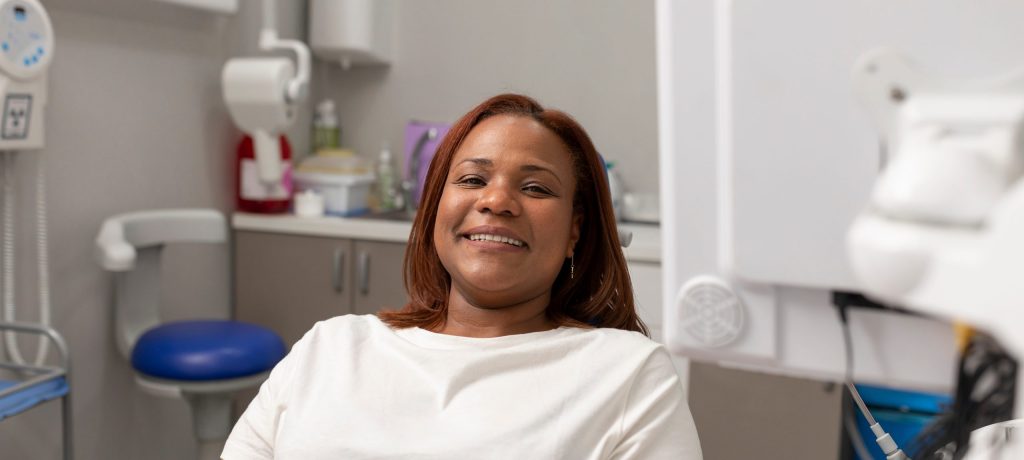Information Library
Start Reading

A cancer diagnosis sparks a host of urgent decisions. Getting care from a dentist for cancer patients may not seem one of the most pressing.
But the oral and dental health side effects and complications of some cancer treatments are serious. They can have a negative impact on patients’ quality of life. They can also force doctors to scale back or even stop treatment—a sacrifice of time patients can’t afford.
At Penn Dental Medicine (PDM), we know proper oral health and dental care for patients with cancer are crucial. Our dentists are active members of patients’ care teams, helping minimize and avoid problems before, during, and after treatment. We’re also conducting advanced research to further improve the oral and dental health of patients with cancer.
 Unfortunately, most people undergoing cancer treatments develop problems in their mouths.
Unfortunately, most people undergoing cancer treatments develop problems in their mouths.
Cancers themselves, including oral cancers, can cause problems. Tumors can put pressure on nerves. Oral pain can interfere with eating, speaking, and sleeping.
But many mouth problems patients experience are side effects and complications of chemotherapy, radiation therapy, immunotherapy, bone marrow transplants, and other treatments.
Oral health issues commonly associated with cancer treatments include:
Cancer treatments tend to weaken patients’ immune systems. This suppressed immune response is temporary, but bacteria and viruses don’t need long to enter the bloodstream.
Chemotherapy and radiation therapy can kill rapidly growing cancer cells. But they can also kill rapidly growing healthy cells, including those in the mucous membrane lining the mouth. This cellular damage leads to mouth sores and ulcers, also known as mucositis or stomatitis.
Mouth sores can make eating and swallowing painful. Dehydration, malnutrition, and unwanted weight loss can result.
 Radiation therapy to the head, face, or neck can damage the salivary glands, resulting in dry mouth (xerostomia). Dry mouth can make tasting, chewing, swallowing, and speaking more difficult.
Radiation therapy to the head, face, or neck can damage the salivary glands, resulting in dry mouth (xerostomia). Dry mouth can make tasting, chewing, swallowing, and speaking more difficult.
Dry mouth is also one of the most threatening effects of chemotherapy on teeth. It increases the risk of tooth decay, gum disease, and oral infections.
Some chemotherapy patients report a chronic burning sensation in the mouth, for no apparent reason. Burning Mouth Syndrome (oral dysesthesia) can accompany dry mouth and other problems, such as changes in how food tastes.
Radiation therapy to the head and neck may damage the “hinge” connecting the skull and jawbone (the temporomandibular joint or TMJ). Jaw stiffness (trismus) and pain may result from the scar tissue the treatment leaves behind. This stiffness interferes with speaking and eating.
Patients with cancer can take steps to minimize the oral discomfort and pain their treatments cause:
 Patients should have a dental visit at least one month before cancer treatment. Doing so ensures the mouth has time to heal from any necessary work. Dental care before treatment could also help prevent or reduce other problems later, including dry mouth.
Patients should have a dental visit at least one month before cancer treatment. Doing so ensures the mouth has time to heal from any necessary work. Dental care before treatment could also help prevent or reduce other problems later, including dry mouth.
During treatment, the patient’s care team should include a dentist who understands the relationship between cancer and teeth problems and other oral health issues. The dentist can help close gaps between cancer care and dental care, intervening as needed to minimize or avoid complications.
You will find dentists for cancer patients at Penn Dental Medicine. Our pre- and postdoctoral students practice under the close supervision of licensed faculty dentists, all of whom have extensive experience treating patients with special health needs.
Each student dentist rotates through our Care Center for Persons with Disabilities. Cancer treatments may leave patients temporarily medically disabled. Our Care Center facilitates their access to the full range of dental services.
In addition, PDM is breaking new ground in dental care for cancer patients. For example, we are currently studying whether a new oral cleaning protocol during chemotherapy can reduce mouth sores’ severity and duration. This large clinical trial will provide key insights into preventing oral infections and ultimately improving patients’ quality of life.
To find out more about the comprehensive care PDM provides all patients, including those with cancer, download our free eBook. “Comprehensive Care and You” details how all our dentists, including dentists for cancer patients in our oral medicine department, can help you.